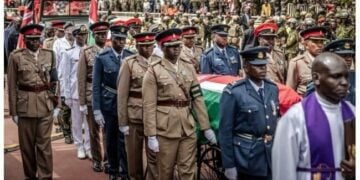Burkina Faso has passed a new law criminalising homosexuality, marking a sharp reversal in the country’s legal stance on same-sex relationships and aligning it with a growing trend of anti-LGBT measures across West Africa.
According to the BBC, thetransitional parliament, an unelected body, approved the legislation on Monday, building on a draft family code adopted by the cabinet last year.
Justice Minister Edasso Rodrigue Bayala, speaking on the state media, outlined the consequences: “The law provides for a prison sentence of between two and five years as well as fines.” He added that foreign nationals convicted under the law would also face deportation.
The bill now awaits the signature of military leader Captain Ibrahim Traoré, who has ruled Burkina Faso since seizing power in 2022 after ousting Lt. Col. Paul-Henri Damiba. His approval would mark the final step before the law takes effect.
Until now, Burkina Faso was one of the few African countries where same-sex relationships were legal. Unlike many former British colonies, it did not inherit anti-homosexuality statutes at independence from France in 1960. However, the largely religious and socially conservative country, where fewer than 10% of citizens identify as non-religious, has increasingly leaned toward restrictive policies.
The move mirrors developments in neighbouring Mali, which criminalised homosexuality last year under military rule. Nigeria already enforced strict bans, while Ghana’s parliament passed a similar bill that was never signed into law. Uganda has gone further, imposing life sentences for consensual same-sex acts and making “aggravated homosexuality” a capital offence.
International organisations have repeatedly criticised such measures. The World Bank, for instance, suspended loans to Uganda in protest against its anti-LGBT legislation, although the restriction was later lifted.





